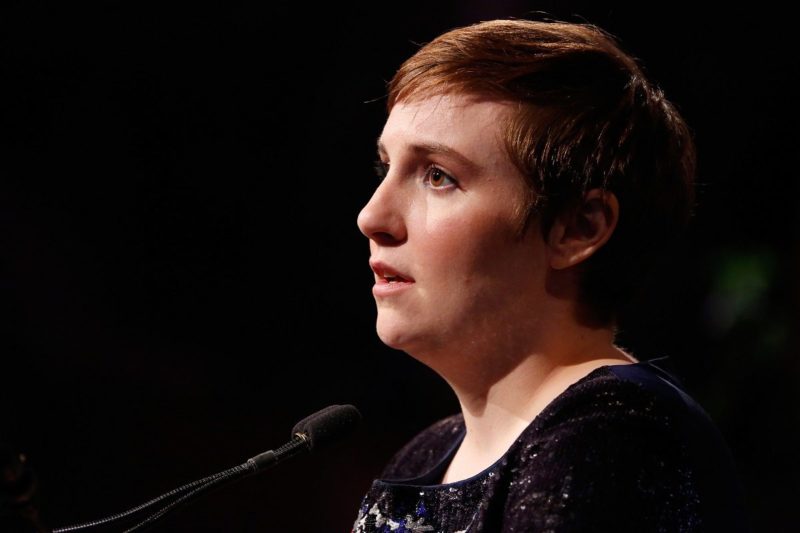The Complicated Mess That Is Lena Dunham’s Abortion Wish
Whether or not you agree with the sentiments flying across the internet, one thing is certain: Dunham has reignited a public conversation about abortion.

Another week, another Lena Dunham controversy.
In a recent episode of her podcast Women of the Hour, the Girls co-creator and star told listeners that she has not had an abortion but that she wishes she had, infuriating anti-choice and pro-choice advocates alike.
The remark came as Dunham was sharing an anecdote about visiting a Planned Parenthood in Texas, where she was approached by a young woman and asked to contribute her own experience to an abortion storytelling project.
“I sort of jumped,” Dunham said. “‘I haven’t had an abortion,’ I told her. I wanted to make it really clear to her that as much as I was going out and fighting for other women’s options, I myself had never had an abortion … And I realized then that even I was carrying within myself stigma around this issue. Even I, the woman who cares as much as anybody about a woman’s right to choose, felt it was important that people know I was unblemished in this department.”
She concluded, “Now I can say that I still haven’t had an abortion, but I wish I had.”
Of course, context is king, and this was largely ignored by major media outlets. Dunham also said on her podcast, “So many people I love—my mother, my best friends—have had to have abortions for all kinds of reasons … I feel so proud of them for their bravery, for their self-knowledge, and it was a really important moment for me then to realize I had internalized some of what society was throwing at us and I had to put it in the garbage.”
It’s clear Dunham meant she wishes she could empathize more deeply with the women whose rights she fights to protect, and that her own internalization of abortion stigma is troubling to her. Although well-meaning, her attempt to destigmatize abortion by wishing for one on the podcast transmits as tone-deaf and flippant—a particularly unfortunate circumstance given her professed dedication to reproductive rights. (Disclosure: During this same episode, Dunham includes a short snippet of Rewire’s CHOICE/LESS podcast.)
She’s since apologized for the comment, saying that she would never “intentionally trivialize the emotional and physical challenges of terminating a pregnancy.”
Still, what has upset many pro-choice advocates is that her comment ignores the various (economic, interpersonal, mental, emotional, and medical) complexities that dictate every patient’s unique experience with abortion. It also diminishes the obstacles many women face, particularly those without Dunham’s resources, when trying to obtain abortion care in today’s hostile political climate. What’s more, her use of the word “unblemished” to describe her abortion-free life only fuels the stigma she (and we) finds problematic. It necessarily pits the one in three U.S. women who will have an abortion in her lifetime—or the blemished women—against those who have not.
And besides, you don’t need to have an abortion to gain street cred as a pro-choice activist, as her comment implies. Having an abortion does not make you a “better” activist or ally; you can easily vocalize your support for abortion rights—as Dunham often does—without personally terminating a pregnancy.
It’s no big surprise that the Twitterverse exploded in response; both pro-choice and anti-choice advocates tweeted their dismay and disgust (though for different reasons). Whether or not you agree with the sentiments flying across the internet, one thing is certain: Dunham has reignited a public conversation about abortion.
While I am generally in favor of such large-scale discussions, unchecked tweetstorms such as this one can also perpetuate harmful abortion myths. In this case, it’s the assumption that abortion is an inherently traumatizing and emotionally exhaustive experience. (That’s not to say it never is, but regret is not the default).
“FYI an abortion is not something you ‘get to have.’ It’s an awful experience one SHOULDN’T wish for like a gift from Santa,” tweeted one person. “I can’t even imagine how offensive Lena Dunham’s comments are to women who actually had to go through abortions,” said another. (Emphasis added.) Several others echoed this position, proving the mischaracterization of abortion is alive and well.
While some women may struggle with the decision to have an abortion and navigate emotional turbulence afterward, others do not. As for abortion causing long-term mental health damage, it’s simply not true. A recent study suggests that restricting access to abortion causes more distress than having one. The overwhelming majority of women who access abortion care feel relief—not regret or anguish.
Why does this matter? Anti-choice legislators routinely use the myth of post-abortion psychological trauma to restrict access and stigmatize the people who exercise reproductive choice. (Need proof? Just look at Texas’ recent publication of an abortion booklet misleading women on this point.)
So let’s put to rest this idea that abortion leaves emotionally crumpled women in its wake. Lena Dunham’s comments were unfortunate, yet we shouldn’t reply by perpetuating falsehoods that could have dangerous, real-life implications that we can’t afford to entertain.
